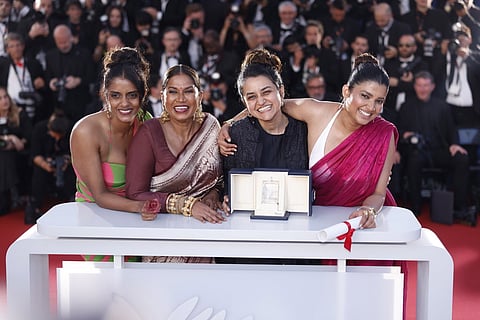

As I write this piece, Christo Tomy’s Malayalam film Ullozhukku (Undercurrent) is riding a rightful wave of appreciation. It’s about two flawed but wonderful women—Leelamma and her daughter-in-law Anju—who confront the secrets and betrayals underlying their relationship and rise above them to find strength and support in each other, the film is an unusual exploration of female solidarity in adversity. Two powerful actors—Urvashi and Parvathy Thiruvothu—are in perfect sync in portraying their characters’ fractious fondness for each other.
Earlier this year, Shuchi Talati’s Sundance-feted Girls Will Be Girls showcased Mira and her mother Anila braving their stormy relationship to discover that they are each other’s best buddies and greatest allies. Preeti Panigrahi and Kani Kusruti pin down the tumult as well as the tenderness of a complicated mother-daughter bond to perfection.
Female fellowship seems to be the theme de rigueur in Indian cinema this year. Be it Rajesh A Krishnan’s easy-breezy Crew, with Tabu, Kareena Kapoor and Kriti Sanon as flight attendants resorting to desperate measures as their airline faces bankruptcy. Or Payal Kapadia’s Cannes Grand Prix winner All We Imagine As Light, that casts a deeply empathetic look at the friendship that brings together three widely different migrant working women in Mumbai—Prabha (Kani Kusruti), Anu (Divya Prabha) and Parvati (Chhaya Kadam).
“It is about accepting each other, despite one’s differences,” Payal told me, adding, “A lot of times, female friendships are marred by the internalised patriarchy that pits us against each other. It has nothing to do with us, but we are conditioned to feel a certain way about somebody else's way of life… Prabha must spit it out to be able to accept her friend Anu.”
Sandhya Suri’s Santosh, that competed in the Un Certain Regard section at Cannes, is about the newly-widowed Santosh (Shahana Goswami) who lands her deceased husband’s police job under the dependent quota scheme. She finds a mentor in her senior, inspector Sharma (Sunita Rajwar), despite being ideologically at odds with her. Konstantin Bojanov’s The Shameless, that played in the same section and won Anasuya Sengupta the best actor award, is centred on her character Renuka’s forbidden love for Devika (Omara).
About two lost brides on a journey to finding themselves, Kiran Rao's Laapataa Ladies has women talking—about abusive husbands, living alone, need for education over domesticity, forgetting their own favourite dishes while cooking to please men—inspiring each other and building sororities through these much-needed conversations.
The Mirror segment directed by Konkona Sen Sharma in last year’s Lust Stories 2, about Ishita (Tillotama Shome) and her help Seema (Amruta Subhash), wasn’t just about a female friendship that cuts across class differences, but also about women’s shared experiences of urban loneliness and repression.
Creating space for themselves in the face of the predominant pan-Indian male cinema, these small but consequential sisterhood stories are more long-distance runners than multi-crore bro-code winners.
Female solidarities are going beyond the screen itself. Things are in a churn and shifting shape behind the scenes as well. A bunch of sensitive, intelligent women film professionals are creating niches for themselves and enabling others to do the kind of work they’d want to do to help create a pool of compelling stories—many of them by, of and for women.
You could call it the power of positivity. Even while outraging about films glorifying toxic masculinity, it’s about joining forces to build counter-narratives and alternatives. It’s about chipping away at things and being clutter-breakers.
Take Richa Chadha and Ali Fazal’s Pushing Buttons Studios that, after starting auspiciously with Girls Will Be Girls, aims at living up to its name in backing diverse projects, groundbreaking storytelling and emerging talents. “She has been an amazing champion of the film (GWBG). She understood it, protected it, and fought for me to have enough time to shoot,” said Shuchi of Richa.
It’s about having each other’s backs. This female force is also walking the talk on creating safe spaces for women in the aftermath of the me-too movement. Kani Kusruti spoke to us about how there was no chaos in the workspaces of the female filmmakers she has worked with: “Everyone was calmer, gentler. It felt very democratic and collaborative… I feel more comfortable in an environment with an equal representation of women.”
Not just the gender politics, the optics of it are heartwarming as well. Like the mere sight of Team AWIAL dancing on the Cannes red carpet. Kani appreciating Anasuya and Anasuya heaping praises on Kani. Whether it’s Parvathy for Undercurrent or Annaben for Adamant Girl, there’s something very affirming to see them being cheered on by their women peers. Kani spoke about how she loves Grace Antony, Ashwathy, Darshana Rajendran and Sai Pallavi in Malayalam cinema. “We are lucky to have been from a generation that saw such marvellous work from Urvashi,” she said.
Then there are those like icon Zeenat Aman, who is expanding the feminine/feminist debate through her lucid anecdotes and profound perspectives on Instagram—the latest, beautifully-written post is on how good it felt to her to play an “ass-kicking role” in Daku Hasina when a “feminist storm was sweeping through India in the 80s”. In the process, she has been creating an incredible dialogue and a community feel across generations of women in filmdom and outside it. She is finding fans in the likes of Farhan Akhtar and Anurag Kashyap as well.
It’s a collective celebration of mutual respect and admiration. It’s not a competitive but cooperative model. And it certainly puts to rest the old saying that women are women’s worst enemies. They are soul sisters.
Namrata Joshi
Consulting Editor
Follow her on X @Namrata_Joshi